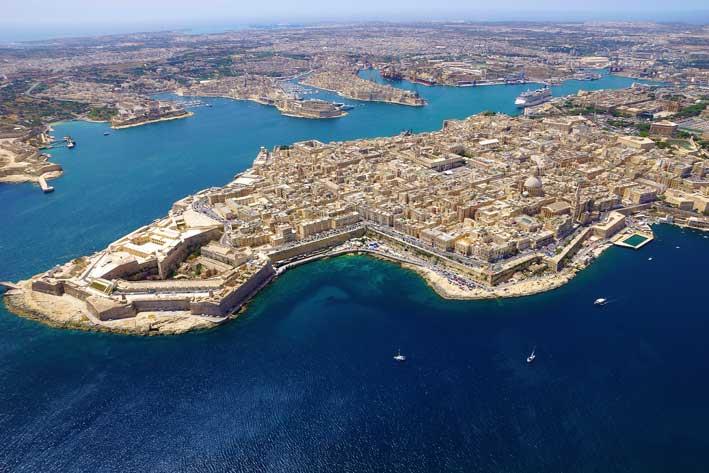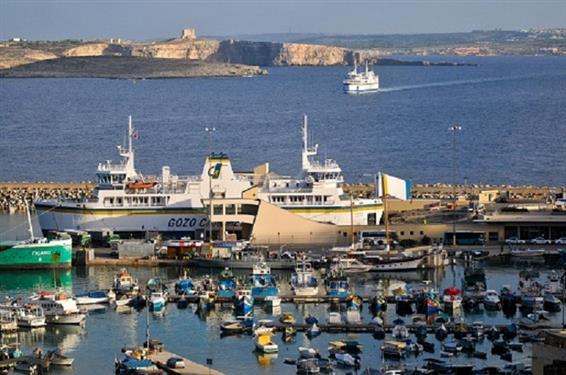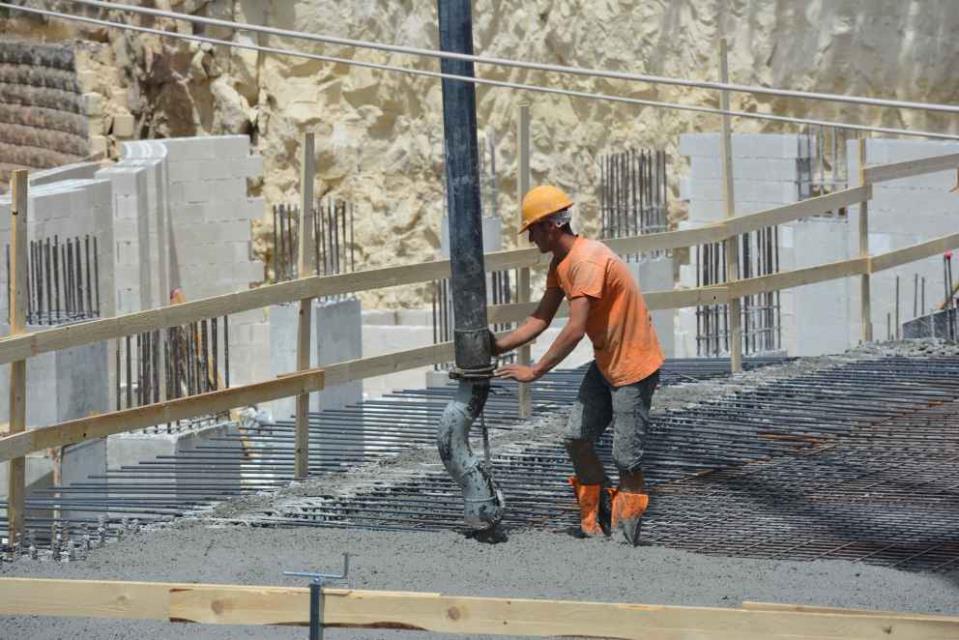The Chamber of Commerce has launched a 59-point economic vision for the period covering 2020 and 2025, with the Malta to Gozo tunnel, corruption, the balance of the economy, and the integration of asylum seekers into the workforce all featuring in the document.
Speaking at the Chamber’s headquarters in Valletta, Chamber President David Xuereb made reference to the political crisis which hit Malta at the back end of 2019, noting that “A negative part of the history of our country has offered us an occasion to stop and think particularly about what our next steps should be.”
He explained that the process had brought together CEOs from across the business sector in a nine-month process to come up with this document, which holds within it 59 recommendations across various subject areas.
Xuereb said that the number was limited in order for the measures to be tangible enough to achieve in a realistic period of time. He said that the five-year term for the Vision is such because that is generally the term that they would use to analyse and plan their own business.
Xuereb said that the Chamber will continue to monitor the implementation of the document every six months, and would share it with all stakeholders in the next couple of weeks.
The document bases itself on a number of points – namely that Malta should become a smart and sustainable island. It emphasises on a number of fundamental points, but also on the need for Malta to regain its credibility.
Indeed, the conclusion of the document reads that “Malta needs to completely rebuild its credibility as an honest global player across all economic sectors.”
“The Island suffered huge damage to its international reputation as a result of the mishandling of the Panama Papers scandal which went unchecked for years in spite of repeated calls, even by the Chamber, to take bold decisions eventually reached unprecedented heights with the outcome of investigations of the murder of Daphne Caruana Galizia”, the Chamber wrote.
“The clean-up process expected by the Chamber and the ensuing institutional reforms must be made in the shortest time possible”, it wrote.

Economic Vision aims to build a “smart, sustainable island”
Giving a brief summary of the key points of the document on Wednesday, Kevin Borg explained that it is aimed at turning Malta into a “smart, sustainable island”. That is reflected throughout the document.
The Economic Vision is underpinned by various strategic principles. The first listed is ‘Quality’, with the Vision reading that the government, business leaders, educational institutions, and civil society must instill quality as an inherent characteristic of Maltese business and society at large.
Similarly, another strategic principle is for these same stakeholders to embrace technology and innovation and place it at the heart of sustainable economic growth.
Global reach is another key principle, with the Chamber saying that Malta must integrate further into the global economy by facilitating the global trade of services and value-added products of enterprises.
Human Capital is another key point listed, with the Chamber noting that Malta’s vibrant economic growth demands that citizens have a high level of competencies and skills relevant to the dynamic businesses of today and the future. Where necessary, they said, Malta must attract the best and brightest talent from overseas as well.
The optimization of productivity is another key point listed, as is the strengthening of governance through strong institutions to secure the rule of law, transparency, equity, accountability, effectiveness, and efficiency.
Finally, the Chamber lists social cohesion as a key point, saying that in a relatively short period, Malta has become a multicultural society calling for increased national prosperity and social harmony.

Chamber calls on government to implement 5G, adopt “zero-tolerance” to corruption, scrap Malta-Gozo tunnel in favour of metro and extended ferry service
The vision identifies four national economic determinants: long-term macro-economic stability; digitalization; governance, government, and the Judiciary; and infrastructure bottlenecks.
In terms of the former, the Chamber recommends that the government should embark on further consultations with regards to the 2nd pillar pensions so to find ways to improve the take-up of these schemes by employers and employees. They also recommend that the Government embarks on a national discussion resulting in a bipartisan agreement on the reforms needed in pensions, health, and long-term care so that there are rendered sustainable and adequate for current, as well as future generations.
In terms of digitalization, the Chamber recommended the setting up of a Prime Ministerial-led task forces which brings together all stakeholders to lead the implementation of the 5G-based new digital economy. They recommended an extensive review of the use of the government’s e-/m- services to identify bottlenecks which may be hindering their use, and that the Malta Information Technology Agency (MITA) should build a Business e-Portal underpinned by virtual processes and functional alignment to create “efficient, effective, and economic triggered processes, and directed to reduce the cost of administration to businesses.
Governance and government issues are clearly an important part of the Chamber’s vision, with no less than seven recommendations presented to address this particular area.
Amongst them is the demand for the government to adopt a “zero-tolerance policy towards all levels of corruption, whether administrative or financial”. They also called for “output and outcome-based budgeting reforms in the Government that are underpinned by performance metrics and transparent public reporting”, while noting that the government itself should establish efficiency as a central tenet to creating value, meaning that it should expand Malta’s productive base by releasing surplus staff into the private sector to enable further economic growth and ensure the most effective and productive use of human capital.
Infrastructure is another key-point. Writing in the vision, the Chamber said that they do not agree with the government’s strategy of addressing the transportation bottleneck by widening roads to increase car flow.
“The science is clear. Research shows that increasing capacity had an induced demand effect that results in increased traffic”, the Chamber wrote.
They recommended that “future transport policy centres around people as a guiding principle”, meaning that infrastructure investment should put people first and not the car. They recommended that Public Transport be given more priority where possible and rendered more efficient in terms of journey times so as to encourage more people to make use of it instead of private cars.
They said that public-private partnerships should be considered by which on-road parking spaces could be reallocated to new multi-storey underground car parks, therefore freeing up the space on the road for people and putting cars underground.
Another recommendation calls for the evolution of public transport systems, and for the government to reconsider the Malta-Gozo tunnel and direct investment towards building a multi-modal transportation backbone with metro connectivity to Gozo and a widened ferry network between Gozo and areas in Malta such as Valletta, Bugibba, Sliema, and Cottonera.

Smart Economy: More funding for innovation, strategy to re-balance economy, and positioning Malta as a ‘test bed’
Achieving smart economic growth is another key point, and again the Chamber has divided attaining that into four parts: smart innovation economy; supporting the competitive make-up of business; developing a highly skilled, highly productive workforce; and strengthening the structural framework of the economy.
On the first point, the Chamber pointed out that innovation-based funding programmes continue to be significantly underfunded, and that an innovation-based ecosystem will fail to materialize unless substantial funding is invested.
The Chamber said that they will support a responsible research and innovation approach that focuses on a number of value-added economic sectors, in addition to blue-sky research.
“For Malta to have an innovation-based ecosystem, the Government must introduce a significantly financed innovation fund – one that attracts world-class innovative research and product development, including first-class talent and accelerators that select Malta as their base”, the Chamber proposed before also calling for the government to actively establish Malta as a ‘Test Bed’ supported by an innovated-based ecosystem that includes a Centre of Excellence.
The Chamber reserved eight key recommendations for the support of competitive businesses.
They urged that the Government reform tariffs and port charges for domestic cargo transport from local ports, and for the reduction of the cost of energy for non-household consumers, a point which would “render business more internationally competitive and reduce inflationary wage prices resulting from price transferring of energy costs from the retail and distribution sector to the domestic economy.”
They said that decisions to introduce new measures for paid time away from work should be left to the individual employer, and that the government should join forces to develop and implement digitalization, innovation, and technology-driven transformation pathways tailored to different sectors.
They also lamented that it is unacceptable for Malta to rank in 84th place with regards to the ease of doing business in the World Bank rankings, and said that the government should take all the necessary steps to ensure that Malta ranks amongst the top five EU member states by the end of this five year period.
There needs to be immediate work for Malta to comply with Anti-Money Laundering requirements, and also on the modernization of Malta’s roads, the chamber said.
Malta should initiate steps to modernise the current corporate tax framework, the Chamber said noting that the current form is not the right instrument to take Malta forward into the future.
“The Chamber emphasises that reforms to Malta’s corporate tax system should be such that the capacity of companies to engage in aggressive tax planning is limited. However, this would be without constraining Malta to apply corporate tax as an instrument of competitive policy”.
In the other themes, the Chamber also called for the educational curriculum to equip all students with basic ICT skills, as well as solid literacy, numeracy, and problem-solving skills to enable students to use ICT effectively.
The Chamber also recommended that the government adopts a strategy which re-balances the economy is such a manner so that it would withstand a failure in any particular sector, noting for instance that the fact that the Maltese economy is highly dependent on the construction sector and on financial services and iGaming – which equates to 11% of the country’s GDP.

Sustainable Economy: ‘More productive use’ of asylum seekers, zero-tolerance to worker exploitation, and better regulation on construction
The Economic Vision looked at three core thrusts that should be addressed for sustainable economy development: an inclusive economy; a planned, safe, and resilient built environment; and resource efficiency and low-carbon economy.
On the first point, the Chamber noted that Malta should seek and embrace foreign talent, and not fear it. The country, they said, should make “more productive use” of migrants who seek refuge in Malta on humanitarian grounds. “If provided with the appropriate language and cultural training, these persons can productively engage in the economy and contribute towards lessening potential emerging tensions in Malta’s fast-changing culture”, the Chamber said.
A far-reaching, zero-tolerance policy towards employers who exploit foreign works by providing them with employment conditions that are against the law should also be adopted, they said. Companies and business who exploit foreign human capital should be named and shamed, they said.
On planning a safe and resilient built economy, the Chamber said that Malta must adopt “carrying capacity” as its approach to spatial planning, meaning that there is a maximum number of individuals and buildings that the country can support in its environment without experiencing decreases in quality of life and the ability to support current and future generations.
They called for the state to regulate the construction industry, and for the new Building and Construction Authority to be equipped with the appropriate resources and tools for strong enforcement.
On the final point, the Chamber said that the government should introduce sustainable construction codes and guidelines to make sure that developments which have a footprint of more than 1,000 square metres have a reduced environmental impact throughout their lifecycle.
“Malta should set the goal of having all new construction consist of positive green energy buildings”, the Chamber recommended.
In the 59th and final recommendation of the document, the Chamber recommended that the Government draw up a new e-vehicle policy which would address infrastructure needed for charging vehicles, and for establishing Malta as a test bed for hydrogen powered vehicles.
Chamber President David Xuereb said that they will be taking the document to stakeholders across the board and presenting it in the coming weeks. He noted that they will continue to monitor progress on the document, and also, if the need arise, change and develop certain matters further.